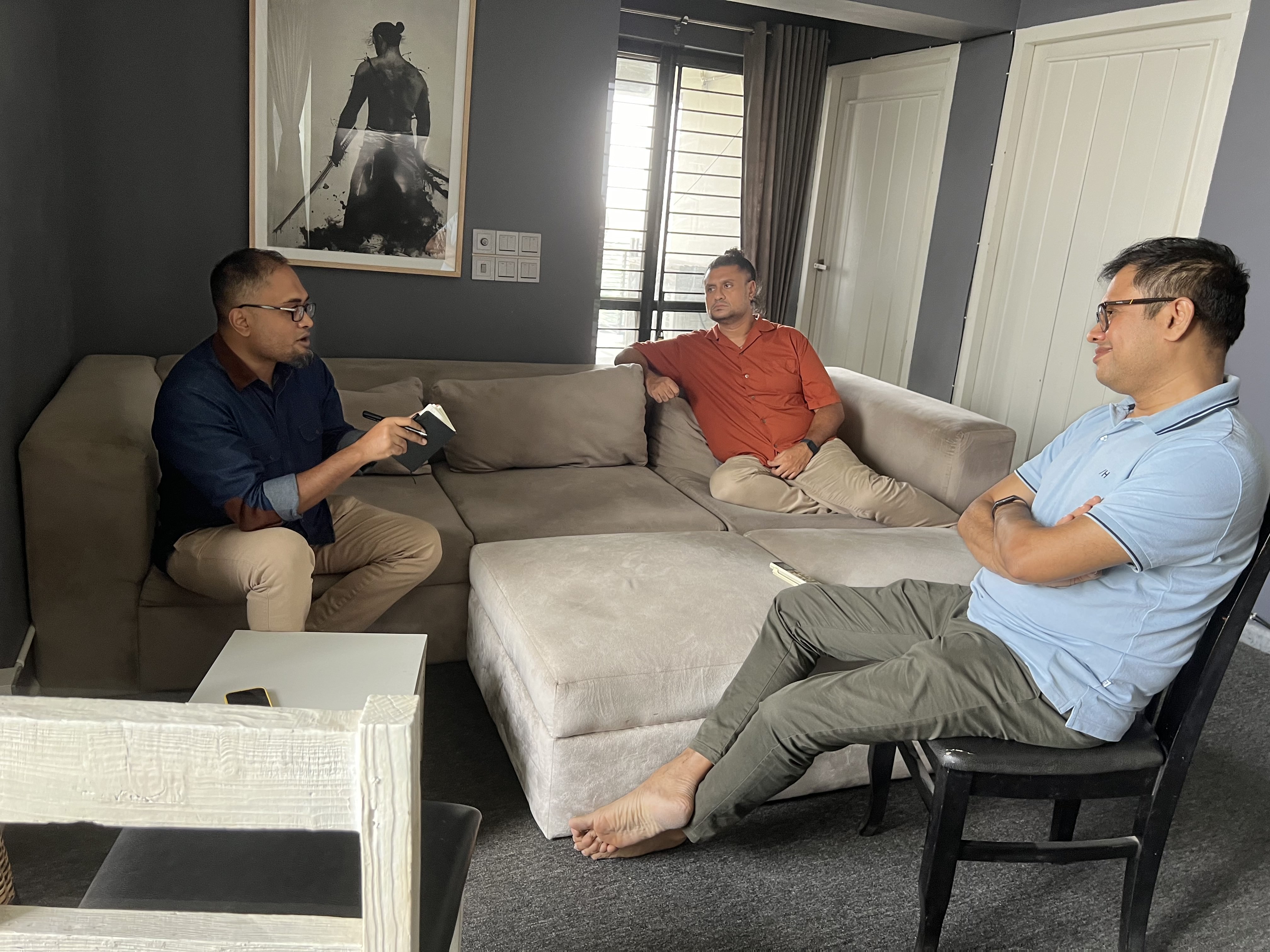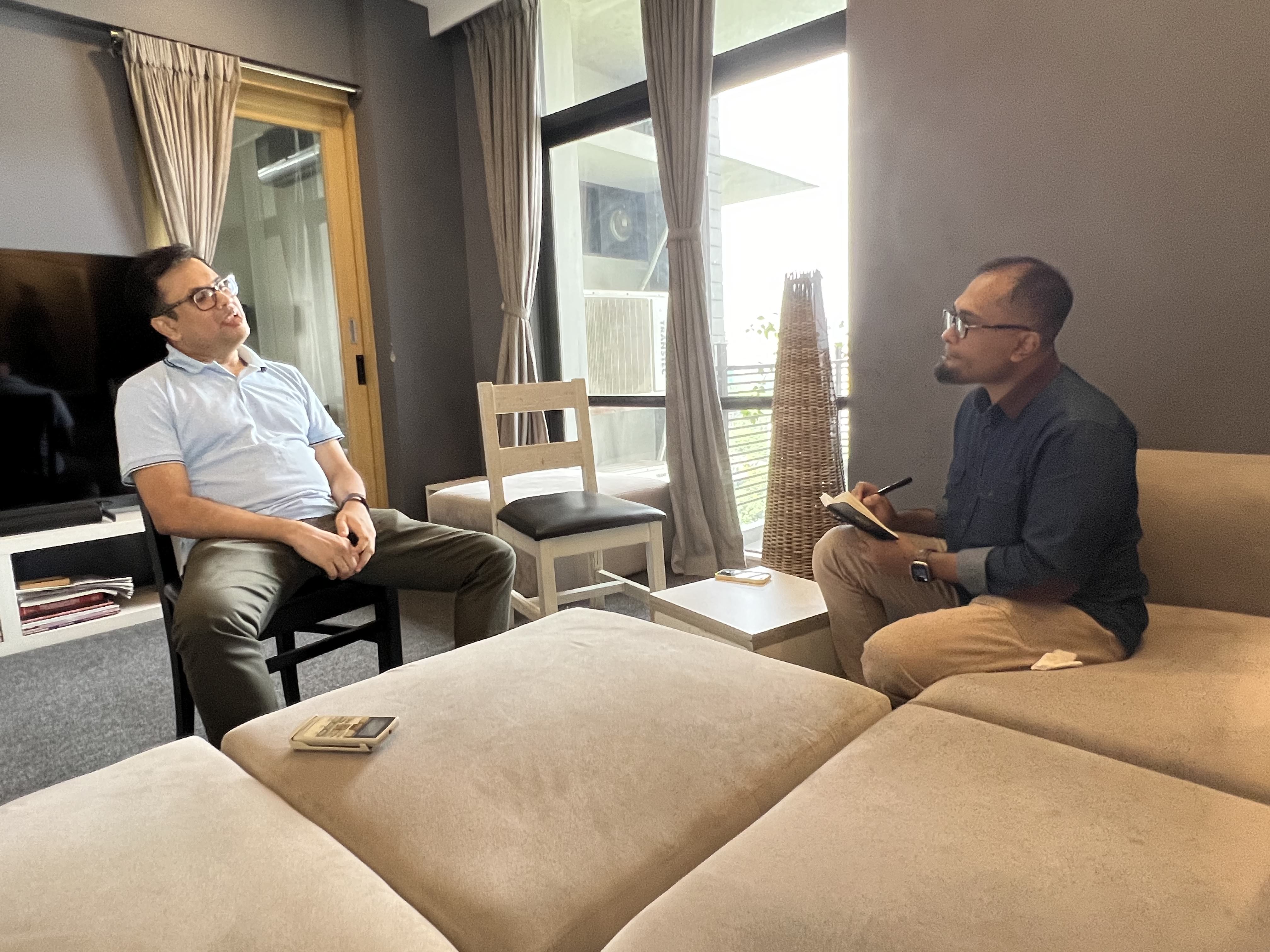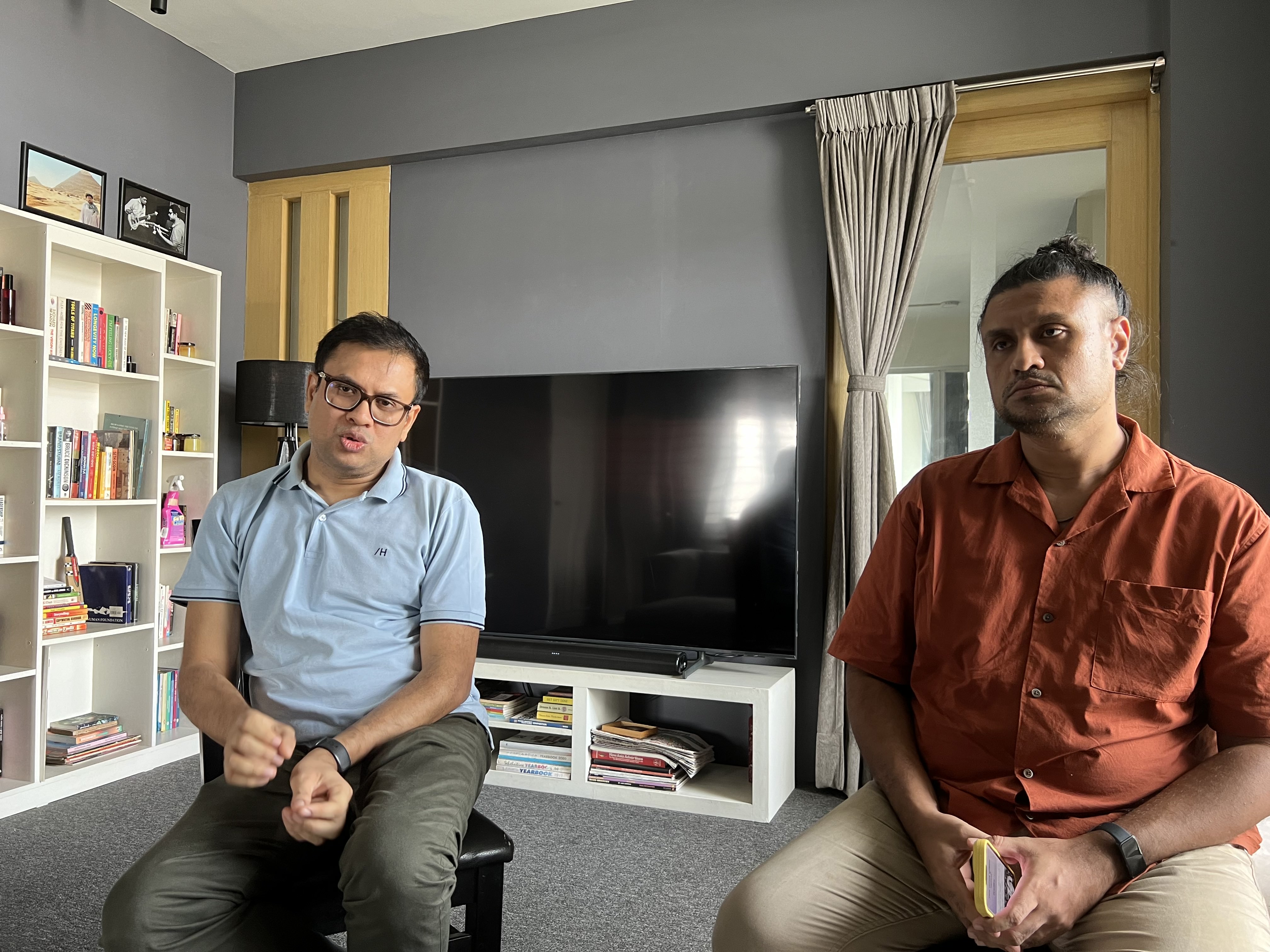Monsoon revolution, social media, and Gen-Z: Perspectives from the Rahman brothers
-66d5c76922888.jpg)
Daniel Rahman and Nayel Rahman (from Left to Right)
If you mention the term "influencer" in front of the Rahman brothers—Nayel and Daniel—they might first react with a cringe and then dismiss it with a chuckle.
This reaction is understandable given the recent tarnishing of the term by some social media influencers who have aligned themselves with discredited figures like deposed dictator Sheikh Hasina, which has probably sullied the concept of “influencer” itself.
Nayel and Daniel Rahman however have substantial Facebook followings and can wield considerable influence over their audiences.
Nayel is known for his sharp, one-or two-line sarcastic posts that often carry layers of meaning that might seem cryptic to those unfamiliar with his style. Although he manages the family's brokerage business, he relishes his role as an armchair analyst.
In contrast, Daniel excels at sharing captivating photos—not of himself, but of unique and relatable subjects.
His insightful and nuanced commentaries on various current issues also offer valuable context about Bangladesh to both local and international readers. His Facebook friends list reads like a who's who of Dhaka’s elite. Alongside his role as an entrepreneur and sports enthusiast, Daniel is a former media executive.
On a weekend morning, Bangla Outlook (English) editor Faisal Mahmud met with the brothers—first enjoying a delightful breakfast of eggs Benedict and later discussing their perspectives on the Monsoon revolution and the impact of social media over coffee and tea.

Here is an excerpt from their conversation.
Faisal Mahmud: My first question is- before the August 5 revolution, social media, particularly Facebook, was viewed as a barrier to large-scale street protests here, with people typically expressing their views online without taking further action. However, did Facebook play a major role in the overthrow of Hasina's regime? Did this uprising challenge the idea that Facebook discouraged people from taking to the streets?
Daniel Rahman: Absolutely. Social media played a vital role in the July uprising, but it wasn't the sole factor in toppling the regime. Instead, it helped mobilize people and build a critical mass, facilitating communication and information sharing. This is why the government responded by shutting down the internet.
However, the core issue at hand is more profound than social media itself; people will protest if the cause is significant enough. For instance, while opposition parties also used social media for large-scale mobilization before the last election, it wasn’t sufficient to bring people from all backgrounds out into the streets.
In contrast, during this protest, social media successfully encouraged ordinary people to leave their homes and join the movement, as they felt they were fighting for a cause greater than themselves. In the end, social media is just the tool that drives this process.
FM: Nayel bhai, what’s your take on this?
Nayel Rahman: The question of whether social media prevented mass gatherings is not easily answered. Now that we have witnessed the successful overthrow of an autocratic regime, it’s clear that the idea of social media hindering street protests is not accurate. However, I’d like to consider this from another perspective.
Social media is an incredibly direct and effective tool for spreading ideas. Without it, sharing ideas would be significantly more challenging. Beyond politics, social media plays a broader role, engaging people with culture, sports, and other interests.
For example, after the last election, many of us felt disillusioned. We had high hopes that the West would enforce their values, but nothing changed. At that point, we even began to believe Obaidul Quader's suggestion that “perhaps we had been deceived.”
During this period of disillusionment, many content creators went silent. Then, Pinaki Bhattacharya proposed a boycott of India, which kept political discourse alive despite the flawed election. This idea gave people a renewed sense of purpose and demonstrated that they still had a role to play.
Social media’s role was crucial in maintaining political engagement. While not every issue will necessarily lead to the fall of a government, staying connected and informed is essential, and social media is unparalleled in its ability to keep people connected.

FM: My second question builds on the first: Considering that the event we're referring to as the “Monsoon Revolution” or “July Revolution” involves state and constitutional reforms, can we truly call it a revolution? If we do consider it a revolution, how should we communicate its core message to the public? What key message should be conveyed to people?
DR: In my opinion, the central message of the revolution is the quest for a fairer society. Although Bangladesh has long endured significant injustice, recent events have driven many people to their breaking point.
Fundamentally, we all aspire to a society where no ruler or authoritarian can violate our rights. Furthermore, this movement was also about calling for necessary reforms. Political parties must acknowledge this and strive to implement the required changes within themselves in the wake of the revolution. That’s the message I want to convey.
NR: My response might be a bit detailed. On the first day of the movement, we witnessed the tragic deaths of six or seven people, including students from public universities. By the following day, students from private institutions such as Brac and East West universities had also become casualties.
This was significant because we had always seen BCS exams as an issue mainly affecting public university students, not private ones. For the first time, private university students were engaged in a cause traditionally linked with public universities. This shift marked a breakdown of previously held biases and barriers between different groups.
Usually, when we see movements like those led by garment workers demanding fair wages and police violence ensues, we might share a few links or statements on Facebook but rarely take meaningful action to address class divides.
However, this time, after private university students were targeted, the class barrier was first challenged by local workers and residents in Rampura—many of whom were low-income individuals working in nearby factories or as street vendors.
They actively joined the movement. Additionally, while women have been involved in protests before, it was unprecedented to see school and college girls actively resisting police forces.
Therefore, I believe the core message of this revolution was the overcoming of personal biases and prejudices. When a cause is significant enough, it can lead to the breaking down of barriers and foster collective good.
FM: My third question is: Regarding Generation-Z– who were at the forefront of the movement and played a key role in ending a nearly 15-year autocratic regime–are we right to glorify them for their achievements? Do you think they were the catalyst for this change, or could the same outcome have occurred with Generation-X or millennials if the right trigger had been present? Was their success due to any particular qualities they possess, or was it more like a powder keg that was bound to explode eventually due to long-standing pent-up anger?
DR: In my view, Generation-Z has distinct qualities that greatly influenced their role in the movement. Unlike previous generations, they have a notably strong ethical stance on right and wrong.

Their constant connectivity to the world and the unrestricted flow of information are crucial factors. They excel at uncovering the truth about one another, engaging in research and fact-checking, which makes them less vulnerable to manipulation. This ability enabled them to evaluate whether the government was truly oppressive and whether persecution was occurring.
It’s also possible that if another generation had been in their position after 15 years of similar conditions, they might have reached a tipping point as well, though this is somewhat speculative.
NR: Taiyeb Bhai (writer Faiz Ahmad Taiyeb) points out an interesting perspective to me: the situation wasn’t entirely spontaneous or entirely planned, but a mix of both.
For instance, in 2015, private university students—part of Generation Z—took their first steps into public activism by protesting against VAT. This was their initial foray into political engagement. By 2018, their involvement had expanded to include the quota reform and road safety movements. The manipulation of the BCS exams by the ruling party sparked the quota reform movement, while the road safety activism highlighted their growing confidence in their ability to drive change.
While the road safety movement was ultimately suppressed, it was significant and rare in its intensity. The success of the 2024 movement built upon earlier experiences and frustrations, especially after the police’s brutal response in Rampura, which galvanized public sentiment. The tragic injury or death of a private university student intensified the collective anger and desire for change.
However, it's important to remember that while Generation-Z has shown remarkable initiative, they are not homogeneous. There are diverse individuals within this generation, including both positive and negative elements. Over-glorifying any group can lead to unrealistic expectations, and it’s crucial to acknowledge this diversity and complexity.
FM: My next question builds on this topic: Why do people in Bangladesh seem to have a strong affinity for rhetoric? Why are they so drawn to statements like "America will take away Saint Martin’s Island"? Or Thousands of RAW officials are conducting 24/7 surveillance on us? Is this a unique characteristic of people in Bangladesh or the broader subcontinent, or do they simply have a particular interest in such rhetoric?
NR: Not too long ago, around 2016, terms like “populism” and “demagogic” began to surface in Western liberal discourse. The origins of these terms are less important than the reason they gained prominence despite many pressing issues.
For example, "populism" once did not carry such negative connotations. Today, it is frequently used with a prejudiced tone, suggesting something undesirable. Historically, populist movements in America were quite different from the current perception of the term.
This shift suggests that something is amiss. It reflects a global trend where emotionally charged speeches from some are met with responses from others. Whether this phenomenon is driven by social media or broader historical currents, it reveals that the liberal values once considered universal are not universally accepted.
This backlash, initially observed in Western contexts, has now manifested globally, evident in leaders like Narendra Modi and political parties like the Awami League. What we are witnessing is not merely unusual rhetoric but a broader reaction to this changing landscape.
FM: Daniel Bhai, what’s your perspective on this? Why do people seem to favor rhetoric over fact-based issues? Is social media responsible for this trend?
DR: I believe the issue stems from a mix of illiteracy and a lack of sophistication. Our limited access to information and education results in the widespread acceptance of simplistic rhetoric. For instance, in Bangladesh, an award-winning freedom fighter might be unfairly branded a "razakar," or a devout individual could be mistakenly labeled a militant due to the influence of rhetoric.
This situation reflects a broader deficiency in education and critical thinking within our society. Additionally, laziness contributes to the problem, as people often gravitate towards easily digestible rhetoric rather than engaging with more nuanced, logical arguments. Emotional appeals also wield significant power and can easily overshadow rational reasoning.

FM: Alright, moving on to my final two questions: If you were to give advice to young advisors or other appointees of the interim government on how to deepen their political understanding and enhance their governing skills, what resources or practices should they consider adopting?
DR: Firstly, considering the academic intelligence I've observed in some of them—particularly from individuals like Mahfuz Alam, who provided theoretical guidance and later became an advisor to Prof. Yunus—there's a notable depth of philosophical content in their education.
When you hear them speak, it’s evident they possess substantial intellectual capacity. I would recommend that they study countries with similar realities to Bangladesh that have achieved significant economic prosperity and human rights advancements. For instance, South Korea is a notable example.
Furthermore, we often find that perspectives on nation-building vary widely among journalists, intellectuals, and student leaders. Some may approach it with an almost anarchistic viewpoint, lacking the responsibility to actively shape the country, while others take on that challenge.
In my opinion, seeking mentorship from someone like Prof. Yunus and his team would be highly beneficial. While they have their strengths and weaknesses, interacting with individuals of that caliber requires a certain level of polish and sophistication. For instance, if a student leader were to present rhetoric to a cabinet member, they would likely be expected to provide substance and a clear plan rather than just grand statements.
NR: I would offer them two key pieces of advice. First, from the events of the 5th, 6th, and 7th August, we came to realize—something we had always known but never articulated—that preserving freedom is far more challenging than achieving it.
This idea resonates with Thomas Jefferson’s quote about the price of freedom being eternal vigilance. This concept appears frequently in various writings, and it’s crucial for them to always keep it in mind.
For instance, the 15th amendment to the constitution showed that we effectively regressed to the situation of 1996. The political settlement we had wasn't perfect, but its collapse sent us further back. In 2010, during the constitutional amendment process, there was widespread engagement and vigilance. If that had continued, we might not have faced the same situation as in August. So, my first piece of advice is to remain constantly vigilant.
Secondly, running a country cannot rely solely on philosophical ideals. It’s essential to be mindful of the practical aspects of governance. Political parties and their leaders must be acknowledged for their roles in movements and rewarded appropriately.
However, if new parties or student groups emerge, they must recognize that practical execution requires specialized knowledge. While philosophical planning is valuable, effective execution demands expertise.
For instance, we’ve seen instances where individuals with little relevant experience, such as Zunaid Ahmed Palak in IT, are appointed to roles where their expertise is lacking. This reflects a broader issue where unsuitable candidates are given positions of responsibility.
It’s crucial to ensure that individuals with the appropriate industry knowledge take charge of their respective sectors, and we need to be careful to avoid repeating these mistakes. So, in summary: maintain vigilance and respect for expert knowledge.

FM: For my final question, which is specifically directed at Nayel Bhai: There’s a prevailing notion, even among economists, that Sheikh Hasina excelled at refinancing and that her government had a strong grasp of it. This allowed her to continue operating based on inflated or distorted data. Do you agree with this assessment?
NR: It’s undeniable that Sheikh Hasina consistently managed to secure financing when needed, but this approach proved ultimately unsustainable. From both an academic and professional perspective, continually postponing problems is not a viable long-term strategy.
This ad-hoc, "we’ll address it later" mentality was a significant flaw of the Hasina administration, and it has reached a critical juncture. Bangladesh was managed with a degree of favoritism, and there is a risk that this could persist. The ease with which money was laundered abroad is particularly troubling. If that money—whether it's 45 billion or 100 billion—had circulated within the domestic economy, it would have been far more advantageous.
Understanding the consequences of political favoritism is crucial. While such favoritism is prevalent in Bangladesh, it poses significant risks, particularly when it reaches a point where recovery becomes difficult. The assumption that crises can be postponed to the next term led to a situation where Sheikh Hasina, after being denied a five-billion-dollar aid package from China, found herself in a desperate position. Therefore, I don't believe Hasina was particularly adept at strategic refinancing.

FM: For my final question to Daniel Bhai: If I were Prof. Yunus and I appointed you as the chief marketing officer for the interim government, what three key aspects would you highlight to make the interim government more appealing to the public?
DR: First, I would emphasize the core reason behind the uprising—ensuring fairness in society. I would communicate that the government is committed to providing equitable treatment for all Bangladeshis across every sector.
Second, I would highlight the government's efforts to enhance the quality of life for everyone in the country. I would detail these improvements thoroughly, similar to how we present issues on social media.
Lastly, I would assure that the government is meticulously documenting everything through proper channels to ensure that those responsible for 15 years of authoritarian rule are held accountable. Additionally, those who are accountable for the violence during the protests will also face justice.
FM: Thank you for your time.
—

